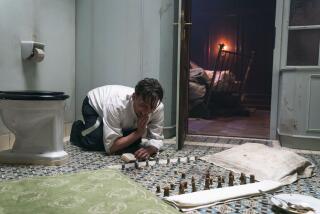An affair fit for a princess
- Share via
A little more than a century ago, minor royalty produced a major scandal in fin de siecle Vienna. A huge story in its time, fodder for an eager press, the wild affair between a princess and a mere lieutenant had been pretty much forgotten. But what a tale it is, especially as brilliantly and memorably re-created by English novelist and critic Dan Jacobson in his scrupulous yet highly imaginative novel, which was long-listed for last year’s Man Booker Prize and is now published in the United States.
Her Royal Highness Princess Louise of Saxe-Coburg -- daughter of one of that era’s most notorious figures, Belgian King Leopold II -- had earlier flirtations around the periphery of scandal. Her brief affair with a sister’s husband, Austrian Crown Prince Rudolf, paled beside his later depredations, which culminated in his murder-suicide pact at Mayerling in 1889. By 1896, Louise was a bored wife and mother, discontented at the approach of middle age and obsessed by her weight and minor health problems. While riding one day in a park near the gloomy palace she shared with her dull husband, his parents and sundry in-laws, Louise’s attention was caught by the flashy horsemanship of a Croatian soldier, Geza Mattachich. He noticed her too and was rapidly installed in her household, nominally in charge of the horses; soon they were whirling through a maelstrom of private passion and public troubles.
Jacobson captures the extravagance that was the hallmark of this heady first stage of their affair. Passionate scenes in bedrooms -- at her palace, her sister’s villa on the Adriatic and countless hotels in fashionable watering holes and the great cities of Europe -- alternated with conspicuous consumption.
In the end it was money that brought about their downfall. Even the huge marriage settlement from her father and her husband’s lavish allowance could not support their lifestyle. Louise forged the signature of her sister, the widowed crown princess, on a note and so brought down upon them the full wrath of the Imperial Viennese court. Mattachich was forced into a duel with his lover’s husband. Although he deliberately inflicted no more than token damage on the corpulent and humiliated prince, his gallantry did him no good. Stripped of his rank (Louise had gotten him promoted from second to first lieutenant), Mattachich was imprisoned under exceptionally harsh conditions, which involved periods of near-starvation and sadistic discomfort. Louise was summarily divorced and declared incapacitated by none other than the famous Viennese psychiatrist Richard Von Krafft-Ebbing, author of “Psychopathia Sexualis,” and confined in a series of psychiatric institutions. But rank still had its privileges: Her gilded cage included many stays in clinics and spas, where Louise indulged her interest in cures for the various afflictions that flourished again now that she was without her cavalier.
But now a good story gets even better. Amazingly (and verifiably), a young Viennese woman became obsessed by the plight of these lovers, whose story she knew only from the press. Abandoning her husband, Maria Stoger got a job in the prison where Mattachich was confined and succeeded in springing him. They had little trouble in doing the same for Louise when she was on one of her periodic visits to a spa. This bizarre threesome then proceeded to -- where else -- Paris, which in addition to being the proverbial refuge of lovers was also the capital of a republic that refused to extradite the fugitives who had so outraged royal respectability.
This strangest of menages lived on through the end of the dynasty they had defied, through war and revolution, into the 1920s. Both Louise and Mattachich wrote their memoirs, which Jacobson has drawn on for this novel. But his re-creation of them and their story owes more to his sensitive and empathetic reimagination of this unlikely pair of star-crossed lovers than to the undeniably juicy raw material their memoirs provided.
Martin Rubin is a critic and the author of “Sarah Gertrude Millin: A South African Life.”
More to Read
Sign up for our Book Club newsletter
Get the latest news, events and more from the Los Angeles Times Book Club, and help us get L.A. reading and talking.
You may occasionally receive promotional content from the Los Angeles Times.









